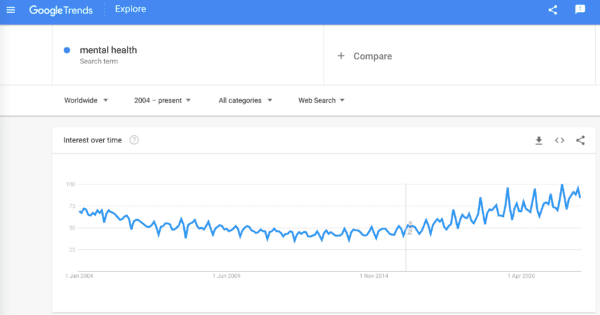Mental Health is Growing in Popularity and Importance. And it is Here to Stay.
This graph from Google Trends shows that people searching for this term are doing so more than ever. Covid and lockdown had a lot to do with bringing this important topic to the forefront of people’s minds. Maybe it is one of the few positives of the pandemic. Without it, the topic of mental health and struggling, like working from home, would have taken another decade for us to face the issue, manage it and start coming out the other side of these important debates.
Mental health is spoken about more than ever and we are all realising its importance for ourselves and others. Plus, we are starting to face into how we manage it. The toughest challenge with mental health is knowing who has good mental health and who has poor mental health. We’ve all seen the social media images of someone wearing the mask of happiness, and yet inside they are battling some pretty ferocious demons. Yet no-one knew.
Robin Williams’s last words were to his wife that night, “Goodnight, my love… goodnight, goodnight.” He then went into another room, and she went to sleep. She found him in the morning. He had drawn his last breath after he uttered those words.
I interviewed Simon Blake, the CEO of Mental Health England last year and asked him, ‘How do we know when someone might be struggling if the masks we wear are so effective?’. His answer surprised me, and I found it so useful. I want to share it with you…
‘You know when you have a cold?’, he said. ‘Of course’, I replied. He continued. ‘People go to work with a cold, and you know that they are not well because they are sniffling, and sneezing. Tissues are in abundance, and they just look awful. Some people suffer with colds, and they are like this. Others just have a dribbly nose, and you’d not even notice’. I was intrigued by where he was going. ‘We need to look for changes in people. For some, they’ll be small changes. For others, big changes. It is the change in people that give us the clues we need as to their mental health and whether they’re struggling.’

Work is tough. Getting the to do done is hard. There’s no time to look up and see how we are doing. Beyond the small talk at the start of a meeting, it’s head down and work. Yet leaders, in particular, need to add to their toolbox of skills the ability to notice changes in people. To observe that Mike normally talks a lot, and yet has said nothing. Julie always says Hello when she comes into work and hasn’t. Andy wants to ask a lot more questions than he normally does – maybe he’s feeling vulnerable.
‘How would you describe your mental health?’ is a fair question to ask. And when they say, ‘OK’. A follow-up question of ‘What 3 words would you use to describe it? Because I am genuinely wanting to make sure that you are fit and healthy in every way, or what I can do to help that’. Certainly, worth asking.
It’s not easy but observing changes in people – noticing the equivalent of the dribbly nose – is a start. A start that might just be the vital help someone needed. The rescue they were looking for and yet too afraid to ask.
Look out for the mental health dribbly nose – a change to signify someone is struggling and ask the question. You’ll always be glad you did.





